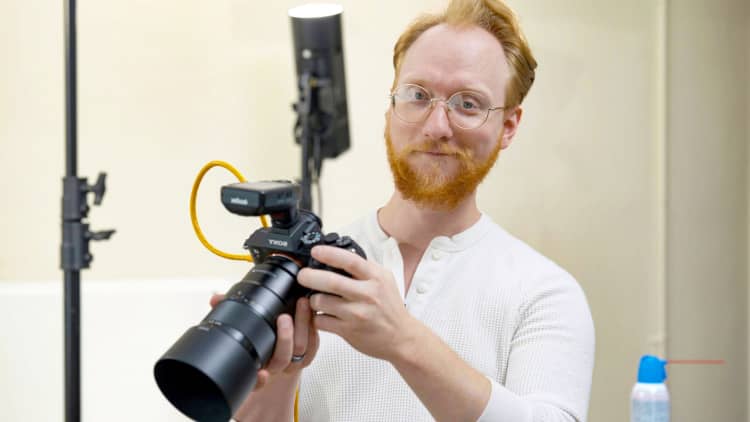
[ad_1]
Finland is the happiest country in the world for the sixth year in a row, according to the World Happiness Report.
The well-being of Finnish people has sparked great interest in the country and its practices. And Finland is offering guidance on how to be happier, free of charge.
Back in March, the country’s tourism department, Visit Finland, announced an offer for 10 people to visit the country and embark on their take of a masterclass on happiness.
Visit Finland reports that they received over 150,000 applications from all around the world for the unique opportunity. In an attempt to reach as many people as possible, they decided to also offer the masterclass for free in a virtual format.
“This masterclass will take you a step closer with insights from five coaches under four core themes: Nature & Lifestyle, Health & Balance, Design & Everyday and Food & Wellbeing,” the course, which became available online on September 14, states.
In hopes of “finding my inner Finn,” I watched all five lessons of the course, and these are my biggest takeaways.
Here’s what I learned from Finland’s happiness masterclass
1. Connecting with nature is important for your mental health, no matter where you live
As someone who lives in a city, I thought reaping nature’s benefits would be virtually impossible for me without traveling far. However, the course taught me that having a relationship with nature doesn’t have to look like being in the forest or sailing on a river; it’s more about being in tune with our five senses as we walk outside to do the simple things like grabbing a coffee or commuting to work.
Without pausing and intentionally paying attention to the beauty around me, I was denying myself the easiest way to boost my happiness: connecting with nature.
Finland is ahead of the game because they have a law called “Everyman’s Rights” which grants people the right to roam and stay overnight in nature, regardless of land ownership. Many Finnish people camp frequently, walk and bike in nature and simply embrace all that nature has to offer.
“It’s true that even a small amount of time spent in nature reduces your stress, clears your mind, gives you experiences and lets you connect with yourself in ways that only nature can do,” Mikaela Creutz, a hiker and nature lover, says during the masterclass.
2. It’s better to have enough than to want for more
I’ll be the first to admit that I view myself as a go-getter, and it’s something that I’ve taken much pride in. But there is a downside to always aiming higher and wanting more, according to April Rinne, an author and speaker who teaches about the importance of embracing change and uncertainty.
“When we’re focused on more, we’re actually never able to find enough,” says Rinne during the course. “The goalpost keeps changing.”
Rinne defines “enough” as balance, harmony and sufficiency. Embracing “enough” means “having all that you need to thrive, but not carrying around excess,” she adds.
“That includes knowing that you are enough just as you are, and you always have been — rather than ‘I will only be happy when I achieve this goal or make this amount of money or can get this particular product.'”
My goal moving forward is to honor where I am in life. Instead of focusing too much on everything else I want, I’ll aim to simply be open to the possibilities that are on the horizon. Not only can this take a huge weight off of my shoulders, but it’ll likely also allow me to feel happier about what I have now.
3. The way you design your space can impact your mental health
Initially, I wasn’t sure what I’d gain from the lesson about design because it didn’t seem to me that it would be essential to happiness. Yet, hearing design professional, Taina Snellman-Langenskiöld, talk about how much our homes and the spaces we visit frequently affect our well-being was fascinating.
“In Finnish, we have an old saying that a poor man cannot afford bad quality,” Snellman-Langenskiöld says in the course.
And you may be surprised to hear that “good” quality for her doesn’t mean the most expensive things. Sometimes, things can have more value to us because we made them with our own hands or the materials used to make them were sustainable and better for our planet.
Snellman-Langenskiöld suggests using design to improve your lifestyle by:
- Only buying meaningful objects that will stand the test of time and always be appealing to you
- Making beautiful things and surrounding yourself with them
- “Taking nature in” by having plants and buying yourself flowers
- Thinking about how you can design your space to make your life easier and more functional
She leaves viewers with this last piece of advice to consider: “Meaningfulness in design is one of the keys to happiness.”
DON’T MISS: Want to be smarter and more successful with your money, work & life? Sign up for our new newsletter!
Want to earn more and land your dream job? Join the free CNBC Make It: Your Money virtual event on Oct. 17 at 1 p.m. ET to learn how to level up your interview and negotiating skills, build your ideal career, boost your income and grow your wealth. Register for free today.

[ad_2]
Source link